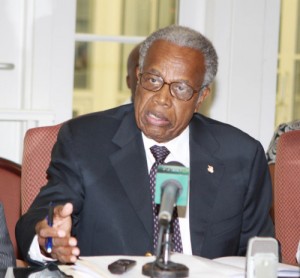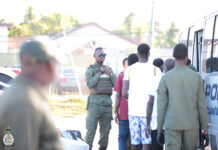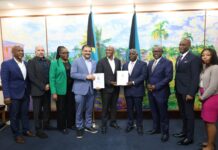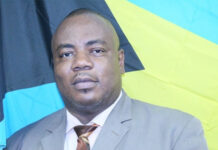International Chief Doctor Inspecting Hospital Says Outbreak is common in hospitals

NASSAU, The Bahamas — Noted regional Medical Doctor and University Professor, Sir George Alleyne, said Tuesday that the detection and management of the acinebacter baumannil bacteria that led to the deaths of two neonates in the Neonatal Intensive Care Unit of the Princess Margaret Hospital in July was “competently addressed” by medical staff at the facility.
Sir George said while no medical personnel can guarantee that there will not be a recurrence of the acinebacter baummannii organism – given the nature of the organism – there are some steps that can be taken “to mitigate (reduce) the possibility of there being a recurrence.”
“Nobody, nobody, nobody in this world can guarantee that there will not be a recurrence. That is humanly impossible to do,” Sir George said. “The nature of the organism is such; the nature of medical care is such, and the nature of institutions (hospitals) is such that what we can do is reduce the possibility of there being one (recurrence), but not to ensure that there is not a recurrence.
“I want to make that point clear right from the beginning,” Sir George added.
Sir George said a review of the case information supplied to him by medical personnel of the Princess Margaret Hospital and the Public Hospitals Authority, made it “obvious that opportune detection of the outbreak” occurred.
He said the outbreak and the nature of the organism, were clearly documented and defined and that as a result of those findings, it was his conclusion that “the handling of the outbreak and the brevity of its length, lead me to conclude that it was competently addressed.”
A former Director of the Pan American Health Organisation and Sanitary Bureau and a member of the Scientific and Technical Advisory Committee of the World Health Organisation (WHO) Tropical Disease Programme and the Institute of Medicine Committee of Scientific Investigation in Developing Countries, Sir George was brought to The Bahamas to provide an expert analysis of the case and history; to review the management of the investigation – including the Report provided by Environmental Safety Services and other reports relevant to the case – and the sanitary policies and practices in the NICU.
He will also advise local public health officials on the continuing steps to take to ensure that the chances of a recurrence are diminished.
Sir George said he was able to visit the Unit and that the Unit was “challenged” in maintaining “internationally-accepted spatial organisation.”
“There is a need to correct the physical spatial allocations in the Unit. For obvious reasons it’s not possible at the moment (but) I am told that when the new Unit is built, this will be corrected,” Sir George added.
Sir George said there are some short and medium-term that should continue to be followed. These include greater frequency of maintenance; greater adherence o the hand-washing protocols already in place and maintenance protection of clothing, etcetera.
“I have said it publicly and I would like to give credit to the staff of that Unit for the work they have done. I think they have done a marvellous job there and there is no doubt that the sanitary policies – everyone knows the sanitary policies and there can be no questioning of the appropriateness of the sanitary policies – but in some instances, the sanitary practices left something to be desired,” Sir George said.
“In the medium term, in all good institutions – and I think this is a good institution – we are careful to establish good programmes of Risk Identification, Risk Management and Risk Communication and I think this is one example of the need for us to be more vigilant in terms of the mechanisms we have in place for Risk Management and Risk Communication,” Sir George added.







